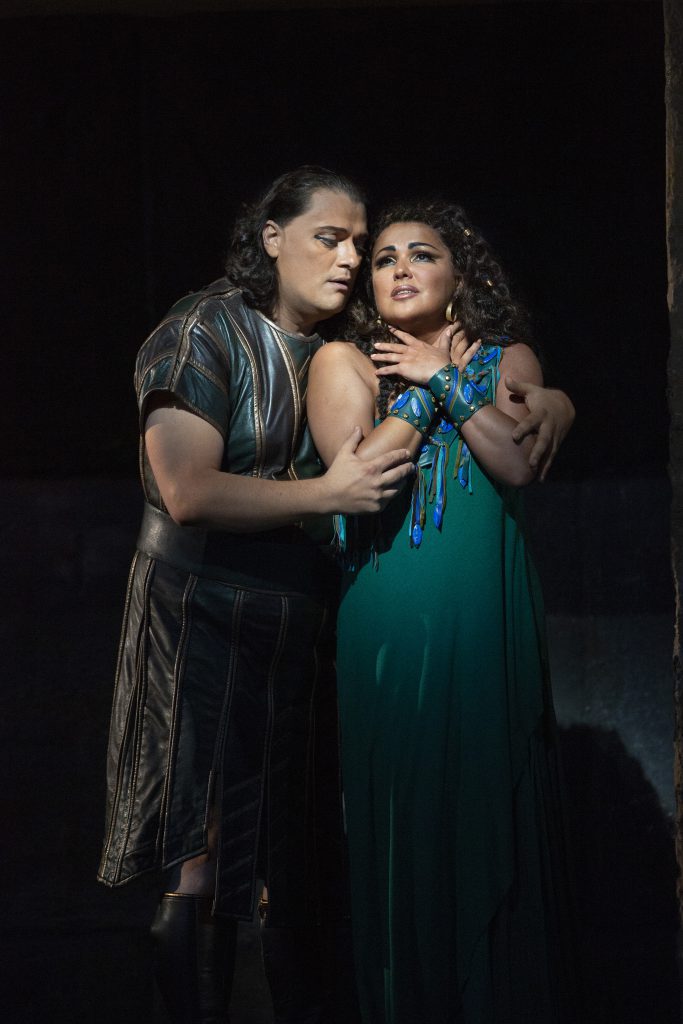Led by a brilliant Netrebko, Met’s all-star “Aida” defines grand opera

Anna Netrebko and Aleksandrs Antonenko star in Verdi’s “Aida” at the Metropolitan Opera. Photo: Marty Sohl
Aidas at the Metropolitan Opera have been rough lately. In the past five years, the revival runs have largely been cast with little-known journeyman singers, filling up a space on the calendar with a popular production, with results that have ranged from mediocre to disastrous.
On night three of the 2018-19 season, the Met finally did right by Verdi’s Egyptian tragedy, throwing at it an eye-popping amount of star power. Netrebko, Rachvelishvili, Kelsey: just one could anchor a production; to have all three for one cast is extraordinary.
Anna Netrebko is among the very top tier of true stars in the opera world, able to sell out any house just by putting her name on the marquee. A company debut in the title role of Aida is a sure bet to sell out the entire run. She’s succeeded in a variety of roles at the Met, but the Russian soprano has rarely sounded better than in the title role of Aida on Wednesday night. There was no trace of the slight wobble that has occasionally crept into her singing. In this performance she showed an unusual focus along with the tremendous vocal power and passionate conviction that are her hallmarks as a performer.
“Ritorna vincitor” was an arresting moment early on, as she threw herself into the scene with abandon. Both here and in “O patria mia,” she showed her gift for playing in the grand style, making a convincing portrait out of the sort of wide gestures that from other singers can come across as over-the-top mugging.
Even more than her interpretations of the major arias, Netrebko’s most memorable scenes were her blazing encounters with Amneris, particularly the Act II duet. Her partner in those scenes was the brilliant Georgian mezzo Anita Rachvelishvili, whose star rises higher with every appearance. Rachvelishvili is an intense singer of equally enormous power, and she had a chance to show off every shade of her voice on Wednesday.
There were of course moments of thrilling force, or deep, urgent passion, as in the Act IV judgment scene. But just as impressive was the gauzy warmth of her asides at the top of Act II, in her quiet, private pleas of lovelorn anguish. It was almost hard to believe that the calm, focused voice here was the same instrument that could easily rise to match a fortissimo from the orchestra.
Quinn Kelsey felt like a real luxury as Amonasro, Aida’s father and the king of the Ethiopians. This isn’t as large a role as some of the juicier villains he’s played at the Met lately, but he made the most of it, showing an enormous, rich-toned voice with a distinct gristle. His vocal characterization is always a marvel to hear, reflecting emotional depth in his tone—a smooth, comforting warmth can suddenly transition to seething anger.
The tenor Aleksandrs Antonenko was overshadowed by the rest of the lead quartet, giving a square, shouty reading of the military hero Radamès. This is admittedly not the most flattering of Verdi’s tenor roles, asking the performer to belt out the fervent, high-jumping “Celeste Aida” right off the bat, and then to bellow with unrestrained passion for the rest of the night; there’s not much room for subtlety. Still, a little more color than Antonenko offered with his uniformly brassy timbre would have been welcome.
The extraordinary talent in this run is not confined to just the lead roles: the supporting cast was filled out with superb singers, as well. Dmitry Belosselskiy, also appearing in the new Samson et Dalila earlier this week, was a towering Ramfis, admirable in bellowing forth his wrath. Ryan Speedo Green was marvelous as the King, a sage and booming presence with his woody bass. As the Priestess of Phthah, Gabriella Reyes was hair-raising in her first Met performance, giving a manic invocation from offstage. Even the nameless messenger of Act I was notable, the firm-voiced tenor Arseny Yakovlev, also making his company debut.
Orchestra and chorus were at their very best under Nicola Luisotti. This is a score that calls for many levels from all hands, and on Wednesday both ensembles showed themselves again to be in a class of their own, responsive, subtle, powerful. Luisotti’s direction was vigorous and stylish, capturing the massive scale of the work even as he found the lightness in the buoyant details of the score.
In all, this was a night to remember at the Met, the first real coup of the season. For all its grandeur, the 1988 Sonja Frisell production—the most massive in the Met’s rep—can seem a stale papier-maché pageant when its cast isn’t up to the challenge. With actors as brilliant as those in this run, it feels suddenly alive again, an example of grand opera’s spectacular potential.
Aida runs through March 7 at the Metropolitan Opera. A second cast, led by Sondra Radvanovsky opens on January 7. Tamara Wilson appears in the title role on October 15 and 18. metopera.org
Posted Oct 08, 2018 at 6:10 am by duna combs
Yes, agree in every way. along with the kudos for the principal singers, I was impressed immensely with Radames and how marvelously he kept the polarization between female and male. Certainly the fire was there, but so well tendered that I am certain the audience as well as I were working to fill in the touch of lips which never happened. Quite a triumph in itself. in a day when all the private shows of love come unhinged! keep on. His voice met this too.
Cordially,
DVCombs
A HD Opera goer.